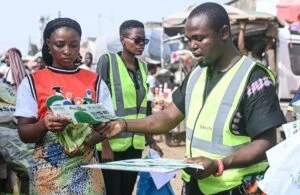By Aisha Gambo
Over the years, Nigeria had practiced poor waste management which posed a threat to the environment and public health of the nation.

According to the Yale Center for Environmental Law and Policy, Nigeria falls among the 30 countries with the worst waste managementloop. practice out of 180 countries in the world.
Nigeria generates 32 million metric tonnes of waste annually among which 2.5 million tonnes is plastic waste. With an annual growth rate of 2.4 per cent, waste generation in Nigeria will increase in subsequent years.
Interventions for waste management
In 2022, the Federal Ministry of Environment, the Embassy of Japan in Nigeria, and the United Nations Industrial Development Organization (UNIDO), signed a US$2.8million agreement to support government efforts to develop sustainable plastic waste management.
In spite of government and other development partners intervention, many household in Nigeria do not have access to formal waste management system which means they mostly use informal channels.
These informal channels consist of collecting waste and dumping them in rivers or burning them which causes water pollution, climate change and disease outbreak.
To address poor waste management in Nigerian households, Ecobarter, a social enterprise begun collecting waste from households in Abuja, Lagos and Ogun states, transforming those waste into new valuable resources.
Founded by Rita Idehai in 2018, the organisation’s vision and mission is to bring sustainability to all people and planet and transform how households consume and manage waste from now till 2020 respectively.
Idehai said that waste such as plastic bottles, cartons, aluminium cans, electronics, metals, nylon bags, pure water sachets, old books and newspapers were collected, sorted and sold to companies that use such waste as raw materials.
“We are taking waste away from the environment, we are keeping the environment clean, that means we are improving public health and we are creating jobs.
“We are also making sure the environment is clean while improving the beauty and the value of properties. So that’s another economic advantage for proper waste management,” she said.
From trash to cash
Apart from keeping the environment clean, improving public health and creating jobs, Ecobarter also create wealth for individuals by giving back points and money in exchange for waste.
“We have integrated platforms, the digital side and the offline side where people request for pickup of their waste at their convenience.
“We collect this waste and in return for giving us their waste we give them points which they get to redeem as cash into their bank accounts.
“They can use it to shop with different partners and services on our market place or even donate to different charity organizations that we work with”, Ecobarter founder said.
She explained that points were awarded base on the weight of waste retrieved, adding that 30 plastic bottles weighs 1kg which is equivalent to one ecobarter point.
She added that one ecobarter point was worth N20 while people with 50 ecobarter points would earn N1000.
Ecobarter Beneficiaries
Rebecca Bulus is a full time cleaner who learned about waste collection when she realised the extent to which the littered waste in her community was making.
She said she started picking up bottles and other recyclable in her neighborhood, adding that she had collected 200kg of waste and has earned more than N10,000 from ecobarter.
“I mostly use the money I get to buy food ingredients to cook for my children.
“But there was a time when my child was ill and we had to buy some drugs at the pharmacy. I didn’t have much on me because I have not received my salary yet.
“I only had the money i saved from collecting the bottles and that was what I used to pay for the drugs ” she said.
Similarly, Mrs Lucy, a pharmacist said she usually plant flowers in used plastic bottles but the bottles piled up overtime occupying space in her home.
She added that the situation changed when he learned about Ecobarter as they came to pick up her waste in exchange for points which metamorphosed to cash.
“I checked my app and I had like 500 recycling points, I was like wow that’s a lot.
“I decided to try to exchange it with cash just to see if I would get the money; so I filled in my request on the app and forget about it.
“It was on the next day that I got the credit alert, and I was like, where is this coming from? then I saw that it was from ecobarter,” she said.
Challenges
“Low level of awareness on how poor waste management practices impact not just the environment but even public health is a major challenge ” Idehai said.
She stated that the organisation spent a lot in terms of energy, time and money to educate people on proper waste management and it’s importance.

She added that another challenge was the lack of existing infrastructure where people would take waste to or get efficient waste collectors that would come their doorstep to pick up waste.
“So we are having to also invest a lot in building collection Centers installing hubs and creating collection route and all of that, and for all of this we would be needing way more funds.
“And you know because we are in Africa, we are female led there’s also disadvantage to investment,” she said
Sustaining the project
“The wastes are raw materials that we sell at a profit to manufacturers. This sales is our primary source of revenue,” she said.
She added that the organisation also get grant funding from different development agencies such as the US Mission Nigeria, the Roddenberry Foundation, Coca cola Foundation among others.
Idehai explained that the Ecobarter constantly run sensitization programmes, create and boost contents on social media to reach more people.
“In 2023, we did the Go Green with Ecobarter and Cleanup with Ecobarter challenge which reached about 25,000 unique people,” she said. (NAN)


